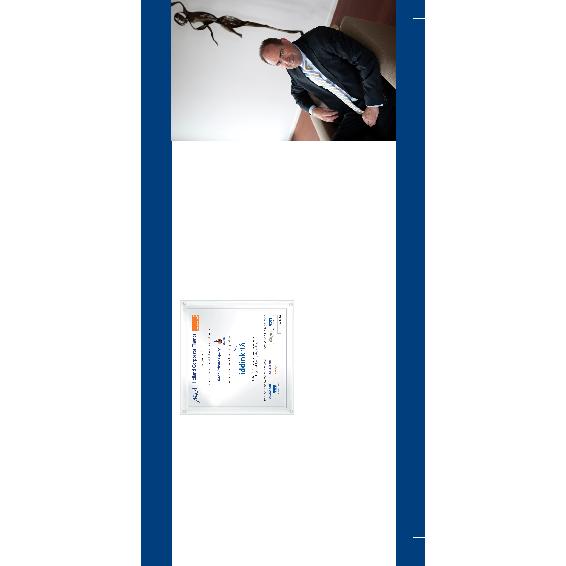
Iddink
Wijnand Spring in `t Veld
Sale of a share in Iddink to Rabo Private Equity
As a company, Iddink could be compared to a professional
athlete who spends most of the year preparing to be in perfect
shape for the one moment when he needs to deliver a peak
performance. For Iddink, a leading distributor of school books
in the Netherlands, that peak moment comes each year when
they need to collect, repackage and ship around six million
books during the months of July and August. Wijnand Spring
in `t Veld, Iddink's former finance and IT director, who became
its CEO in early 2009, is proud to give a tour of one of its two
giant warehouses while it is buzzing with activity in the middle
of July. "You need to make sure you run a perfect operation,
otherwise you will not survive in this business", he says as
he displays his passion for IT and his detailed knowledge of
the home-built system that directs and controls the young,
mostly temporary workers that carry around the books. Yet
in the summer of 2007, focussing on their core process and
tweaking it to perfection was no longer sufficient for Iddink,
as they found themselves on the eve of fundamental changes
in the market.
We want to move deeper into the schools and help
them to become as efficient as they can be in the
area of ICT and educational content
Rapid digitalization
At that time, Iddink's annual strategy session resulted in a list
of numerous opportunities for growth. Some of these were
related to the rapidly consolidating market, others to a pending
new legislation that would make school books free for students.
Of more fundamental importance however was the impact of
the rapid digitalization of class rooms. "I fully expect that within
thenextfiveyearsdigitalweb-basedcontentwillreplacemany
of the traditional school books", says Spring in `t Veld. "That
means we will have to transform ourselves into an ICT service
provider while continuing to be a logistics company as well."
Overseeing their strategic to-do list, Iddink, a family owned
company with around 40 personnel at that time, realized they
had more opportunities than they could explore by themselves.
They had neither the management capacity nor the time available
to continue independently. Iddink concluded it needed one or
more strategic partners to help speed up their transformation
process.
Favourable impression
WhenIddinkhiredHollandCorporateFinancetohelpfindsuch
partners, both domestically and abroad, they were surprised
at HCF's insistence they should not only talk to logistics
companies, IT and telecoms providers or publishers, but also
toprivateequityfirms."Atfirstwedidn'tappreciatewhatprivate
equity could mean to us", recalls Spring in `t Veld. "We thought
adealwithprivateequitywouldbeprimarilyaboutrefinancing,
and that was never really an issue at Iddink." In the series of
talks with potential partners that followed however, one of the
parties that stood out was Rabo Capital, part of the captive
private equity arm of Rabobank Group. "Our perception
of private equity has turned 180 degrees", laughs Spring in `t
Veld. "Rabo Capital impressed us with their excellent knowledge
of our business, their tremendous network and their ambition
to engage on a long term buy-and-build strategy with us."
Apparently the investors had an equally favourable impression
of Iddink because in April of 2008, less than four months after
theirfirsttalks,bothpartiessignedadealinwhichRaboCapital
becamea"significantshareholder."
Quite a change
Iddink has changed considerably since then. Although it still
owns a considerable part of the company, the family that
owned and ran Iddink for the past thirty years has willingly
taken a back seat. As new owners, Rabo Capital also helped to
put in a place a new, heavyweight supervisory board with the
former CEO's of Schiphol Airport and ABN Amro's Netherlands
division as members.
| | | | | | | | | | | | | | |
| | | | | | | | | | | | | | |
| | | | | | |
48
49

